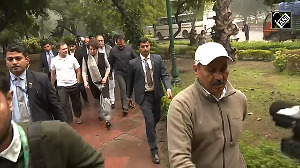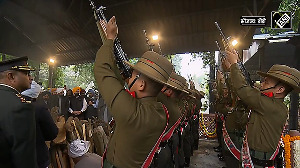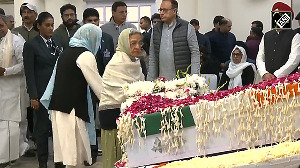Senator Richard Lugar, Indiana Republican, who is the chairman of the powerful Senate Foreign Relations Committee, has said that the US-India civilian nuclear agreement is the most important strategic diplomatic initiative of the Bush presidency.
In his prepared opening statement for the Committee's mark-up of legislation on Thursday to facilitate the nuclear deal, which was made available to rediff.com, Lugar said President George W Bush 'by concluding this pact and the far-reaching set of cooperative agreements that accompany it', had embraced 'a long-term outlook that seeks to enhance the core strength of our foreign policy in a way that will give us new diplomatic options and improve global stability'.
He said the deal, which would allow India to receive nuclear fuel, technology, and reactors from the United States, 'benefits that were previously denied to it because of its status outside the Nuclear Nonproliferation Treaty', and expressed confidence that it would not undercut the US' responsibilities.
Instead, Lugar predicted that the deal 'can be a lasting incentive for India to abstain from further nuclear weapons tests and to cooperate closely with the United States in stopping proliferation'.
"We have already seen strategic benefits from our improving relationship with India," he said, and pointed out that 'India's votes at the International Atomic Energy Agency on the Iran issue last September and this past February demonstrate that New Delhi is able and willing to adjust its traditional foreign policies and play a constructive role in international issues'.
Lugar said the bill he has authored along with the ranking Democrat in the Committee, Senator Joe Biden of Delaware, which sources told rediff.com was a veritable bill that was overwhelmingly approved by the House International Relations Committee on Tuesday, 'except that it has some technical points but that they have been included in consultation with the Administration is an important step toward implementing the nuclear agreement with India'.
However, as Congressman Henry Hyde, Illinois Republican, who chairs the House International Relations Committee had warned on Tuesday, Lugar too said, "We should understand that it is not the final step in the process."
He explained that like the Hyde/Lantos bill that has been reported to action on the House floor, the Lugar/Biden bill too only 'sets the rules for subsequent Congressional consideration of a so-called 123 Agreement between the US and India'.
The Lugar/Biden bill, also like the Hyde/Lantos bill, preserves Congress' prerogatives with regard to the 123 Agreement, whereas the Administration's original proposal had the 123 Agreement entering into force 90 days after submission unless both Houses of Congress voted against it and then overcame a likely Presidential veto.
Lugar said in his remarks, "I am pleased the Administration changed course on this matter and agreed to submit the 123 Agreement with India to Congress under normal procedures. This means that both the House and the Senate must cast a positive vote of support before the 123 Agreement can enter into force. In our view, this fully protects Congress' role in the process and ensures Congressional views will be taken into consideration".
The lawmaker said that beyond this key provision, Senator Biden and he have sought to ensure that important export control and non-proliferation efforts 'remain strong and consistent', and noted that Sections 2 and 3 of the Lugar/Biden legislation 'include those of the Congress provisions on US-India relations and policy declarations that give voice to a set of important policy issues involving bilateral relations, democratic values, nuclear non-proliferation regimes, fissile material production in South Asia, and support for IAEA safeguards and the Nuclear Suppliers Group'.
"All of these concerns are reinforced by the bill's comprehensive reporting requirements," Lugar added.
Section 4, he said, 'provides waiver authority from provisions in the Atomic Energy Act and removes the prohibition on cooperating with India due to its 1998 weapons tests and its existing weapons programs. At the same time, Section 129 of the Atomic Energy Act, which is preserved under the Lugar-Biden bill, terminates nuclear cooperation if India conducts a nuclear test, proliferates nuclear weapons or materials, or breaks its agreements with the IAEA or the United States'.
Section 5 of his bill adopts all of the Administration's requirements to ensure that India is meeting its nonproliferation commitments, and in addition, requires that decisions in the NSG enabling nuclear trade with India are made by consensus and consistent with its rules.
Lugar said, "Our aim is to guarantee that this multilateral organisation will continue to play a vital role in global non-proliferation efforts."
Section 6 of the Lugar/Biden bill supports timely consideration of nuclear export applications, but prohibits exports of equipment, materials or technology related to the enrichment of uranium, the reprocessing of spent nuclear fuel, or the production of heavy water. The provision allows narrow exceptions for the export of these items to India from the United States if they are for proliferation-resistant activities that involve the United States or have the sponsorship of a recognised international body like the IAEA.
Lugar stated that 'this provision is consistent with the Administration's policy regarding such transfers, and it would allow cooperation in sensitive nuclear areas only if such cooperation could be implemented with no risk of proliferation'.
Section 7 of the bill requires the creation of a system to ensure that no items exported to India are diverted to any uses that are not peaceful and seeks to ensure US compliance with America's NPT obligations, while Section 8, requires 'annual Presidential certifications that India is meeting its commitments under the July 2005 Joint Statement, its Separation Plan, New Delhi's Safeguards Agreement and Additional Protocol with the IAEA, the 123 Agreement, and applicable US laws regarding US exports to India.
Section 9 requires that no action can be undertaken pursuant to peaceful cooperation with India that would violate any US obligation under the NPT, and Section 10 explicitly stipulates that if India conducts a nuclear test, the US-India civilian nuclear cooperation will be terminated.
The final Sections 11 and 12 define Missile Technology Control Regime adherence and various terms used in the bill.
Lugar said the US-India agreement had resulted from a delicately balanced negotiation and acknowledged that 'neither side got everything it wanted. Nevertheless, the Bush Administration and the Indian government came to the conclusion that the agreement was in the national security interests of both countries'.
The lawmaker, who over the years has been a fierce advocate of non-proliferation, said, 'I agree with this assessment', and this was why he was urging his colleagues in the Committee to vote in favor of the legislation 'without conditions that would kill the agreement'.
Lugar was lavish in his praise for Biden 'for his close cooperation on developing this important bill'.
He said 'the legislation reflects our shared views and concerns. He and his staff have been valuable partners in the drafting of this bill, and the final product is much stronger because of their efforts. I believe we have constructed a bill that allows us to seize an important strategic opportunity, while ensuring a strong Congressional oversight role and reinforcing US non-proliferation efforts'.
Sources predicted that the vote in favor of the bill would be overwhelming in the 18-member Committee and were saying it could be as high as 17-1 with only Senator Barbara Boxer, California Democrat voting against it.
On Tuesday, multi-millionaire IT entrepreneurs Ken and Kavelle Bajaj also hosted a massive fund-raiser for Biden, who has made clear he is seeking the Democratic Presidential nomination in 2008.
The fund-raiser, was held under the auspices of the US-India Friendship Council, coordinated by community political activist Swadesh Chatterjee, the former president of the Indian American Forum for Political Education.
The Council was launched specifically to lobby for the passage of the nuclear deal.






 © 2024 Rediff.com -
© 2024 Rediff.com -